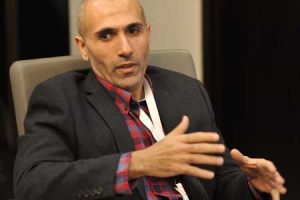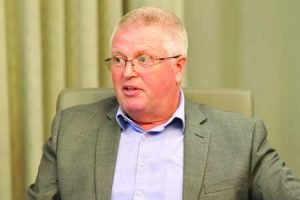IP has been around for a while now and it is often believed that forward-thinking players in the industry have forged ahead with this transition. But is it really that simple or is the migration to IP ridden with challenges that are way beyond the control of the immediate players? Dr. Marco Lohse, Director of […]

IP has been around for a while now and it is often believed that forward-thinking players in the industry have forged ahead with this transition. But is it really that simple or is the migration to IP ridden with challenges that are way beyond the control of the immediate players?
Dr. Marco Lohse, Director of R&D, IP Gateway at Rohde & Schwarz, set the stage for the discussion by questioning the levels of readiness for IP migration among the participants within their respective segments, namely the telcos, satellite and broadcast markets.
When do you think your workflows will be 95-99% IP-based?

With more than 17 years of experience in the IT industry, working in research and development and having done pioneering work in the field of transmission via unmanaged IP networks, Dr Lohse seemed the right person to pose that question across to a gathering of MENA professionals from amongst telcos, satellite operators, systems integrators and broadcasters at a roundtable in Dubai last month. Organised by BroadcastPro ME in conjunction with Rohde & Schwarz, the roundtable was titled: IP-based broadcast contribution revolution or evolution?
Joining us for this discussion were a mix of experts from the MENA telco, broadcast and satellite sectors including Ahmed Al Muhaideb, VP- Broadcasting and IPTV Services, du; Mohammed Bushehab, Manager/Satellite TV Broadcast Operations, Etisalat; Peter Van Dam, Technical Advisor to the CEOs office, Live HD; Nader Mokhtar, Director of MCR/DVB and STB technology; Bilal Mohieddine Saab, Broadcast Manager, Yahlive; Yusuf Al Buti, Head of Engineering and Technology, twofour54; Yaser Hassan, Director of Transmission Operations, Arabsat; Eyad Aldwaik, Director of Engineering, Intigral and Ibrahim Sleiman, Division Manager at Tek Signals, a local system integration company.
Telcos are already very advanced in terms of IP adoption, which is a good thing because they have to take the lead, stated Peter Van Dam, Technical Advisor to the CEO’s office at LIVE HD Broadcast Facilities, a subsidiary of Abu Dhabi Media Company.
Broadcasters are largely in the transition phase deploying hybrid solutions. At IBC for the first time in 2017, I saw IP as a usable tool across the entire chain offering greater flexibility and ease of use within a production environment. Given that situation, I believe in the next two years, we will see more people make the transition to IP. By that time, I hope we can also finalise standards with regard to compression and other critical issues, he commented, adding that the speed of transition to IP will depend largely on the ease with which the migration to IP can be undertaken, the flexibility it offers and the cost involved.

Eyad Aldwaik from Intigral was sceptical about the two-year time-frame stating that broadcasters typically tend to use their technologies until they stop working to get the best out of their investment.
Among traditional broadcasters, I have seen hardware going for 15 years or more. Why change it if it is working? My guess is it will be a long time before we get to 80-90% IP within broadcast. With regards to contribution, however, we are already there. Today, newsgathering over IP is a common phenomenon. You dont need to make a big investment for contribution so its already happening, he pointed out.
This is not early days for IP delivery standards have evolved allowing for a higher quality of delivery Eyad Aldwaik, Director of Engineering, Intigral
If there was any scepticism about the reception IP would receive from satellite operators, it was instantly dismissed. The satellite players in the room welcomed the technology stating that it brought several benefits to their business although they agreed satellite was still the primary medium of distribution in most countries.
Bilal Mohieddine Saab, Broadcast Manager at Yahlive pointed out that satellite will continue to be the medium of choice in underdeveloped countries where broadband remains a luxury.
For example, in some of our markets, we still use satellite for contribution to deliver signals to the hub because internet infrastructure — even the open internet, not just fibre — is still not reliable.

Yaser Hassan of Arabsat highlighted that IP actually complements the offerings that satellite operators provide their customers while also lauding the merits of the latter.
In traditional payload, which is the communication system on the satellite, we would receive the signal to the satellite payload, process it, amplify it, multiplex it and send it. So payload configuration on the satellite was limiting the flexibility with regards to high-throughput satellites. But now with the digital payload and IP concept, satellite manufacturers provide more flexible payloads enabling a dynamic frequency plan and better processing on the satellite, where satellite operators can provide a huge capacity with frequency reuse.
IP is a positive technology for satellite operators… it opens so many new avenues. Its like having another dish on the table Yaser Hassan, Director of transmission operations, Arabsat
I believe IP is a positive technology for satellite operators. We might lose some of the business because of changing viewing habits, but at the same time, it opens so many new avenues. Its like having another dish on the dining table.
From digital payloads to the flexibility of frequency plan and beam coverages done via software, satellite operators are clearly playing their part by coming on board the IP bandwagon.
The discussion then turned to who is driving the change to IP with more viewers moving from linear TV to OTT platforms.
Elaborating on how upgrades are often customer-driven, Mohammed Bushehab of Etisalat said: As a telecom company, our business is driven by our customers. We can purchase a system or add new features but we cannot keep it idle for a long time. Some of the local channels are still running on SD. While a lot of big channels are going towards 4K and 8K and we do support 4K, most customers do not require this service so our investment on that front would remain minimal until we have more volumes. Otherwise, it is difficult to justify the investment.

Yusuf Buti from twofour54 added that different factors drive the market.
To some extent, it is the manufacturer. If they decide to stop all the SDI equipment and adopt a new standard, everyone else will also be forced to make that move. The consumer, on the other hand, drives the market with their changing viewership habits. LiFi looks like it is going to replace Wifi and this may pose some risk for the satellite operator because to move between Dubai and Abu Dhabi, I dont need satellite to receive signal or data that can be received through the LED light on the street.
Channels [need to] use the technology creatively – ranging from production to metadata and all other processes Yusuf Al Buti, Head of Engineering and Technology, twofour54
This statement prompted Hassan of Arabsat, to highlight innovations in the satellite sector.
In some areas, as a consumer, one might not require a satellite for certain applications. But on the other hand, the satellite operator can play a key role in service delivery. We can provide very high throughput because nowadays with the KAband spot beams and even future Q and V bands, that enable high throughput connectivity, you can enjoy internet through satellite.
While experts have ceased writing obituaries for satellite operations over the MENA region given the limited coverage provided by fibre, Nader Mohktar, Director of MCR/ DVB of MBC Group explained that the broadcaster continues to use satellite successfully but has moved some of its operations to IP for more flexible, diverse and cost-effective delivery. He was, however, quick to add that satellite continues to play a crucial role in the broadcasters distribution model.

During the last five years with MBC, we have moved most of our contribution from satellite to almost all IP. We are right now building a new site where everything, from end-toend is based on IP. The playout is sending streams into the encoder and from the encoder to Mux even to the distribution over international fibre to our satellite providers it is all based on IP. Even the remote connection and file-transfers to the playout is over an ISP circuit. So we have a mix of both. It doesnt mean we are cutting out satellite contribution but it does mean that we are converting everything from satellite to IP to get its added benefits. The quality remains the same for 4mbps on satellite and IP.
During the last five years with MBC, we have moved most of our contribution from satellite to almost all IP Nader Mokhtar, Director of MCR/ DVB and STB Technology
Although everyone in the room agreed that cost efficiency was a big driver for IP migration, they also agreed that the pricing offered by telcos in the region for bandwidth was several times higher than other markets and required significant correction.
Everyone agreed that satellite continues to remain the main medium of distribution and IPTV /OTT remains a complementary technology although they also admitted that it would soon become mainstream.
Yusuf Al Buti from twofour54 elaborated. The advantage of IP is that channels like shopping channels that want interactive solutions with their audiences can easily deploy them. They have all the signals in the IP format and they can introduce new applications on various devices. Barring rights and subscriptions, you have the broadband and now it is a question of how creatively you apply the technology.
The participants in the room agreed that the transition to IP workflows brought with it the advantages of affordable processing and agility in allocating technology resources. Benefits also included the lower cost of IP when compared to SDI routing, and greater flexibility with regards to workflows. However, the drivers of change were still unclear.
Are we quality driven or are we vendor driven? asked Van Dam of Abu Dhabi Media.

With 30-40% of our channels already in HD, we have a high level of quality, I believe. I was watching Top Gear for 30 minutes on my phone and there was no hanging or any other glitch. Yes, IP will make matters cheaper and easier, but today we are more vendor driven than broadcast driven. If we could wait another two to four years, we would. But we cannot because most other countries have moved on. Japan has gone 4K and 8K and Winter Olympics in Korea is to be broadcast 90% in 4K.
The challenge is the proverbial Mercedes versus Tesla debate. We are still launching channels the traditional way. Peter Van Dam, Technical Advisor to the CEOs Office, LIVE HD
Responding to one of the roundtable questions as to whether industry stakeholders are looking towards a future with IP, Ahmed Al Muhaideb, VP Broadcasting & IPTV Services at du stressed quality, when he said: As a telecom operator, I not only serve my consumer segment but also the broadcasting enterprises like the OSNs, Dubai TVs and MBCs of the world. These broadcasters are quality driven. They cannot tolerate a frame loss. I go back to Dr. Marcos initial question about going IP end-to-end, from the contribution to the last mile delivered to the satellite in my living room.
Satellite will still be on whether we use the current ASI packaging or we go IP all the way. In my opinion, it is easy to convert the contribution feeds to IP technology thats already happening but at the other end, to my STB to go as IP feed, that will take time because IP scares broadcasters with regards to quality. It is a wrong notion, but viewers do not tolerate flickering, loss and buffering on the satellite receiver. Not all broadcasters have the confidence that we will not face these problems on IP-based feeds.
Van Dam added that it is paramount that decision makers buy into the concept.
Last year with du we did a proof-of-concept on a playout. The playout was a combination of dus teleport facility, Huawei for storage and Imagine Communications as a software-defined playout provider and it was a success. It did everything it had to do without a glitch. But we are now waiting on decisions. The challenge is the proverbial Mercedes versus Tesla debate. We are still launching channels the traditional way but more advanced IP-based technology gives us new opportunities to scale up and launch channels at the switch of a button or scale down when we dont require them. IP gives us the opportunity to pay per use.
Dr Lohse concurred and said broadcasters will be willing to make the transition once they are convinced that IP can provide the same level of quality as existing technologies.

Ibrahim Sleiman, Division Manager of Tek Signals elaborated on the inherent scalability of Ethernet providing a futureproof solution for the industry.
If you look at the market, the consumers are the driving force behind data throughputs. Ethernet is the delivery mechanism for high throughput. now Ethernet. The next big jump in Ethernet speeds will be to 400Gbs also known as 400 gigabit Ethernet, or 400GbE. Whether you go over fibre, IP/MPLS network or satellite or microwave as contribution, this is only a medium of transmission. With satellite technology today, when you start RF, the input to the modem is Ethernet. The input to the telecom network is also Ethernet. So, Ethernet, in my opinion, is going to dominate and it is the future. If you want to continue with the data throughput requirements exponentially rising, you need to go with this technology. For choice of medium of transmission, you have the triangle of price, practical/efficiency and quality determining the most viable engineering solution. In some places, the situation and price would make IP more viable and in other scenarios, satellite or microwave would be more appropriate.
Without digitisation, we cannot maintain the three pillars of capacity, penetration and cost Ibrahim Sleiman, Division Manager at Tek Signals
The discussion then turned to standards and which would be the most appropriate to follow.

In this regard, Mohammed Bushehab, Manager Satellite TV Broadcast Operations at Etisalat, pointed out: I recall 10 years back, we used to work on DVB-H and standardisation killed that project. I believe that the rapid change in standards is good especially when it results in the reduction of cost of technology for broadcasters and consumers. When HEVC encoders came, the cost of MPEG4 encoders reduced and when the 4K screens came, HDTV became less expensive as did the receivers. The beauty of IP is you can use the same platform for both OTT and DTH. An IP-based system gives you the privilege to decide seamlessly the quality you want to maintain per channel. As telcos, we have changed our platforms to IP-based solutions till the end of the transmission chain until the point where RF takes over.
The beauty of IP is that it supports both OTT and DTH platforms Mohammed Bushehab, Manager/Satellite TV Broadcast Operations, Etisalat
One of the greatest push factors for choosing IP-based routing has been to accommodate 4K production. Today, it takes four HD-SDI cables to carry a single 4K signal. In contrast, a 10GbE cable can take that same signal with a light compression.
The driving force is throughput, which means peoples requirements will force a standard, asserted Sleiman of Tek Signals.
He added: Open standards will drive innovation and more applications. Security concerns will always be there but that should not stop engineering from moving forward to provide more throughput and capacity and more penetration.
Intigrals Aldwaik and LIVEs Van Dam pointed out that the question about standards becomes irrelevant within a software-defined environment.
We should just buy licences, comply, plug in and move on. The medium is critical, not the standard. Is the medium reliable enough to carry my signal? Aldwaik asked.
Al Buti of twofour54, offered his perspective:
Organisations such as Dubai Media City or twofour54 host many different customers that have their own standards. With broadcast, you can decide on which standard you want to adhere to. In a multi-client environment, it is difficult to enforce it.
Having said that, IP has delivered on the promise of both quality and trust. We recently conducted a successful experiment with the BBC where we had to cover some of the football in Abu Dhabi. They wanted to have very quick uplink to London. And we did it through 4G with contribution to our facility in Abu Dhabi and from there, an uplink to BBC. We trust this technology because each time we have tried it, both the technical and management teams have been impressed with the flexibility, price on offer and matchless quality.
With IP on the table, the issue of security is never too far away. Here, one of the questions posed by the organisers of the roundtable regarding managed versus unmanaged IP networks, found resonance.
Questioning the notions of redundancy, often a roadblock to IP adoption, Van Dam of Abu Dhabi Media said: When a French channel was hacked to such a level that IP addresses on the mux were changed and the channel was unsteerable for 12-14 hours, it was essentially the worst fear of every broadcaster come true. Is the IP-based playout solution secure enough? I believe yes. But I am usually in the minority when I say this. Having backups in the same office does not make it immune to fire or water damage. Cloud-based redundancy is more secure. I believe playout should go to a cloud-based environment and for that, both management and the legal departments need to adapt.
Elaborating on the issue of redundancy, Mokhtar of MBC observed: We contribute to Arabsat as well as Eutelsat over a fibre circuit. It is a managed circuit. However beginning of 2017, we partnered with Etisalat and generated MBC+ elife over an internet circuit unmanaged. I think it is better to have two different internet circuits from two different internet providers to make sure you have a full redundancy. On a managed circuit, you will definitely achieve 99.95% reliability, and this is our experience with our current fibre circuit provider. Even if you have a problem with the main fibre, you can switch to the backup and route the signal to your destination and that is the beauty of IP.
Offering an interesting innovation from the satellite industry, Bilal Saab, Broadcast Manager of Yahlive believes satellite operators can offer services to OTT players in areas that are not served by fibre connectivity or at times when data demand is high.

In the case of millions of viewers accessing the same content, the cost based on usage as offered by satellite providers is helpful coupled with the optimisation of technology on the ground. With small return paths through the 3G network or with push Video-on-Demand (VOD), satellite operators can help DTH providers in regions that have limited fibre to provide Catch-up TV or even OTT to their top consumers. It takes just 10 minutes to download a full HD movie through push VOD. It is still early days and it can be a solution.
Satellite will continue to be the medium of choice in underdeveloped countries where broadband remains a luxury Bilal Mohieddine Saab, Broadcast Manager at Yahlive
The OTT issue evoked some contention from Mokhtar of MBC who stated that the primary distribution for OTT will always be over the internet just as the primary distribution for broadcast has been satellite thus far. The latter half of the roundtable focused on issues of IP over unmanaged networks and the critical need for collaboration among broadcasters as well as telcos and satellite operators.
Broadcasters [need to be] convinced that IP can provide the same level of quality as existing technologies Dr. Marco Lohse, Director of R&D, IP gateway at Rohde & Schwarz
While Van Dam spoke of the important role regional advertising enabled by IP-based workflows play in ensuring revenues to broadcasters, Hassan of Arabsat spoke of the value-added role IP plays for satellite operators in the area of HTS satellites. Van Dam also brought attention to the flexibility offered by IP through the ease of launching pop-up channels that are time-specific. All agreed that IP has taken over with regard to contribution, but satellite will stay on the distribution side of the workflow.
The role of IP within broadcast will become increasingly important with time, but how fast the transition to IP takes place will depend significantly on ease of use, the flexibility of integrating technologies and the cost of installation. Broadcasters around the table agreed that they would prefer to have a one-stop shop for all their distribution and contribution needs rather than moving between satellite operators, ISP providers and telcos. They called for greater integration between the three players so as to provide a more efficient and streamlined service to customers. It was also agreed that for IP to be successful in the region, the quality of its delivery must be on par with what satellite provides now.
Emphasising the need for creative applications, Al Buti of twofour54 said in his concluding remarks:
Looking at the big picture, we will definitely move forward in terms of adopting IP because more manufacturers will produce IP-based products and solutions. What needs to be seen is how the channels use the technology creatively ranging from production to metadata and all other processes. TV can get smarter with creative applications. For instance, broadcasters should be allowed to display as a layer on the television, promotions and deals to be had and this information can be distributed geographically based on the IP address of the Smart TV. IP should now drive creative ideas and applications because data can be manipulated for required ends.
Bushehab of Etisalat highlighted the vote of confidence telcos have given IP over the years, when he said:
Most of the telcos, for some years now, have been changing their workflows to IP-based platforms till the end of the transmission chain before the RF point. Satellite will definitely be there as long as they generate revenues. More applications and features will be IP driven. The beauty of IP is that it supports both OTT and DTH platforms. As for quality and service, that will be driven by the customer.
Stressing that IP is a satellite operators friend, not foe, Hassan of Arabsat said: What I can see, based on what we have discussed so far is that IP offers added value for satellite operators because it will enable us to provide HTS satellites. The amount of capacity we are going to lose as satellite operators in contribution is going to be compensated by the high throughput capacities that we are providing directly to the ISP. Satellite and IP complement each other in different areas. In comparison to the traditional satellite we can do frequency reuse. We have more flexibility in payload, design and coverage that will allow us to offer huge capacity at the same cost, making depreciation and amortisation of the satellite assets more sustainable.
Responding to the question put forward by the roundtable organisers about broadcasters looking towards a future with IP, Mokhtar of MBC said: I believe that a one-stop shop is the way forward. We need some collaboration between the telco and the satellite operators. As a broadcaster, either I go to du for example and request, in addition, services on Arabsat or vice versa (this is in case the uplink site is not in the same country as the broadcaster). There should be collaboration between both companies to deliver signals from end to end and manage it for the broadcaster, thereby streamlining our task of achieving connectivity.
Recognising the varied levels of development in the MENA region, Saab of YahLive said: While IP contribution will take over and satellite will remain, I strongly believe that in future, IP and satellite will complement each other and having the same models on different mediums will remain. It will be improved in some places faster than other places but both will coexist.
Van Dam of Abu Dhabi Media offered a reality check when he said: We forget how much of IP we already use in our everyday lives. I cant imagine that we do not have a file-based solution within many of our premises. IP is the way forward on a technical level to guarantee service to our end customer, the viewer at home, with maximum redundancy and security and flexibility parameters that we cannot achieve today.
A veteran of many such discussions, Muhaideb of du, recognises that 10 decades of traditional telecom will not give way easily to five decades of information technology though the path towards an all-IP telco is now not that improbable.
Definitely IP is a boon to the satellite industry as well. Mainly, in my view, the customers, i.e. the broadcasters have to be convinced. They have to overcome their fears around security, quality, redundancy and other issues to fully exploit the IP opportunity.
Underlining the fact that IP is a solution for increased efficiency, Sleiman of Tek Signals said.: As a transmission engineer, I believe IP will prevail. It is a form and means of digitisation. Without the digitisation, we cannot maintain the three pillars of capacity, penetration and cost.
“They [broadcasters] have to overcome their fears around security, quality, redundancy and other issues to fully exploit the IP opportunity” – Ahmed Al Muhaideb, VP- Broadcasting and IPTV Services, du
IP will continue because it serves a purpose. In broadcast, we use MPEG as a standard for compression and DVB as a standard for transmission whether S2, C2, T2, etc, depending on what the application is and medium of transmission in that region is. IP is the standard for the telco GIGE network, creating unprecedented throughput and effectiveness.

In response to a query by the moderator about whether 100% of customers can be reached even on the edges of the network via public internet or even competitors lines, Aldwaik of Intigral observed: This is not early days for IP delivery. The delivery has been there for a while and standards have evolved allowing for a higher quality of delivery.
Eventually, you have to go to the customers wherever they are. Here in Dubai, with my headend in datamena, we use dus network and offer guarantees. Once you step outside the UAE, the quality of service cannot be guaranteed unless you have multiple routes towards your customer. The last mile is the last mile. If the customers bandwidth is bad, his experience will be bad. But you can do your best to deliver the content in the highest quality possible until the last mile.
Telcos play a big role and different ISPs can always peer with each other. Peering is another solution, allowing the exchange of data between two networks that is basically free of charge. It is early days for peering in this region.
We have done some tests with amazing results. The more people step out of their silos and work in collaboration especially between ISPs, the more we can look forward to a different but sustainable business model going forward.








































































